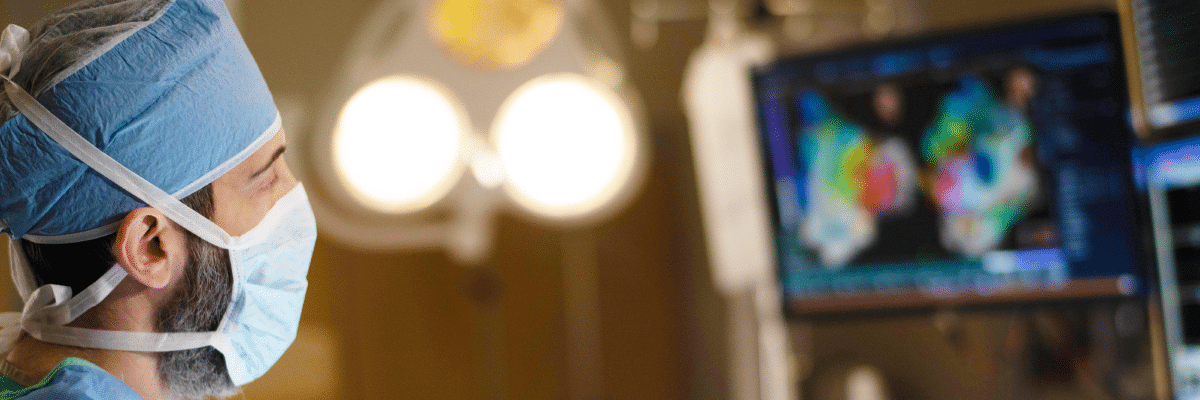Electrophysiology

Managing Irregular Heart Rhythms
Some cardiovascular conditions are caused by electrical problems that affect the heart’s function. Typically, we can diagnose and treat these problems through our electrophysiology lab.
To understand electrophysiology, it’s important to understand how the heart’s electrical system works. Heart muscle contains specialized cells capable of producing electrical impulses that move through the muscle. In healthy hearts, those impulses are predictable and cause the heart muscle to contract and pump blood. But the electrical signals do not travel through the heart muscle as they should if you have a cardiac rhythm disorder or arrhythmia.
We test your heart’s electrical activity by performing an electrophysiological study (EPS). Using specialized catheter tubes that can transmit electrical impulses, doctors see where the electrical signals in your heart start and end. This can help them locate the exact area of your heart that’s the source of the problem. It also helps to pinpoint the right treatment, which can be a low-risk catheter ablation to destroy the damaged tissue that causes the abnormal heartbeat or the implantation of a pacemaker or implantable cardioverter defibrillator (ICD), which can help monitor and correct your heart’s arrhythmia when it begins.
Our Services
Grady’s Electrophysiology Lab is used to diagnose and treat several different cardiovascular conditions.
Abnormal heart rhythms, also known as arrhythmia, occur when your heart beats too fast (a condition known as tachycardia), too slow (bradycardia), irregularly (atrial fibrillation), or in a racing manner (atrial flutter). Arrhythmia can occur if heart functions are disrupted, damaged, or compromised. They can cause discomfort, pain, or a pounding in your chest. While arrhythmia can be serious, most cases can be controlled with treatment, which may involve lifestyle and dietary changes, medication, minimally invasive procedures, or surgery.
Sudden cardiac arrest occurs suddenly and often without warning. It usually results from an electrical malfunction in the heart that disrupts the heart’s pumping action, cutting blood flow to the brain, lungs, and other organs. Individuals who suffer a cardiac arrest lose consciousness and have no pulse. They require immediate CPR or the use of a defibrillator. Treatment may include medications, an implantable device, or other procedures.
Syncope is the medical term for fainting or passing out. It is caused by a temporary drop in the amount of blood that flows to the brain and can occur if you experience a sudden drop in blood pressure, a slowed heart rate, or changes in the amount of blood in areas of your body. If you faint, you will likely regain consciousness quickly, but you may feel briefly confused. Treatment usually involves medication and dietary and lifestyle changes. In some cases, the condition may require the implantation of a pacemaker or implantable cardiac defibrillator to control the heart rhythm.
Valvular heart disease occurs when any valve in the heart is damaged or diseased. If the valves are diseased, the heart cannot effectively pump blood through the body and it must work harder, either because the blood is leaking back into the chamber or against a narrowed opening. This can lead to heart failure, sudden cardiac arrest, and death. The condition might be managed with medicines to treat the symptoms. However, if the valve is seriously diseased, surgery may be needed to replace the valve.
An electrophysiological study (EP study) evaluates your heart’s electrical system and can be used to check for abnormal heart rhythms. During an EP study, a physician threads wire electrodes through a catheter in the vein, into the heart, using a special kind of X-ray called fluoroscopy. The electrodes measure the heart’s electrical signals and can be used to stimulate the heart tissue to try to cause an abnormal heart rhythm. This is done to evaluate the heart rhythm and find its cause. EP studies may also be done to help evaluate how well a medicine is working. Learn more.
Catheter ablation, also known as radiofrequency or pulmonary vein ablation, involves inserting a catheter into a blood vessel and guiding it to the heart. When it reaches the area that’s causing the arrhythmia or irregular heartbeat, it can destroy those cells to restore a regular heartbeat. There are two main kinds of catheter ablation:
- Radiofrequency ablation. The doctor uses catheters to send radiofrequency energy (similar to microwave heat) that makes circular scars around each vein or group of veins.
- Cryoablation. A single catheter sends a balloon tipped with a material that freezes the tissues to cause a scar.
Locations and Directions
Grady Memorial Hospital
80 Jesse Hill Jr Drive SE
Atlanta, GA 30303
Heart & Vascular Center - 2nd Floor
Emergency Care: 24 hours a day, 365 days a year
Outpatient Care: Monday-Friday: 8 AM - 5 PM
(404) 616-1000 (Main)
(404) 616-1000 (Appointments)
Parking is available
Public Transportation
- Georgia State Station (0.5 Miles)
Why Choose Us
Grady is equipped with state-of-the-art hybrid operating rooms/interventional suites. A hybrid operating room is an advanced procedural space that combines a traditional operating room with an image-guided interventional suite. The combination allows our cardiologists to perform complex, advanced surgical procedures.
However, if it becomes necessary to convert a minimally invasive surgery to an open procedure, these hybrid spaces allow for a smooth transition by providing all the needed technology and expertise in one space. The result is that Grady can use the latest procedures to provide more options for patients with complex conditions.
Appointments and Referrals
Grady’s Heart & Vascular Center accepts new patients with referrals from either primary care providers or other specialists. Please ask your provider to use our patient referral checklist and email us the details. We will contact you to schedule an appointment.
If you are an existing Grady patient and have a MyChart account, visit MyChart or call our scheduling line at (404) 616-1000, to make an appointment.
Our Doctors
Every hospital treats patients. At Grady, we strive to treat them better, more efficiently, and more effectively. Our mission to care for all who need us attracts cardiovascular specialists from across the nation. They are drawn here by the knowledge that we test the limits of medicine by innovating existing standards of care, researching cutting-edge drugs and therapies, and exploring novel treatments.
Our zeal for innovation has given Grady a national reputation for medical advancement in areas like cardiovascular disease, cancer, burn, stroke, diabetes, infectious diseases, women’s health, sickle cell, and other conditions cared for by specialists in our centers of excellence. Access to all of these accredited practices is available to every Grady patient and our collegial environment means that specialists routinely help to care for their colleagues’ patients.
Cardiovascular Disease
Internal Medicine, Cardiovascular Disease

